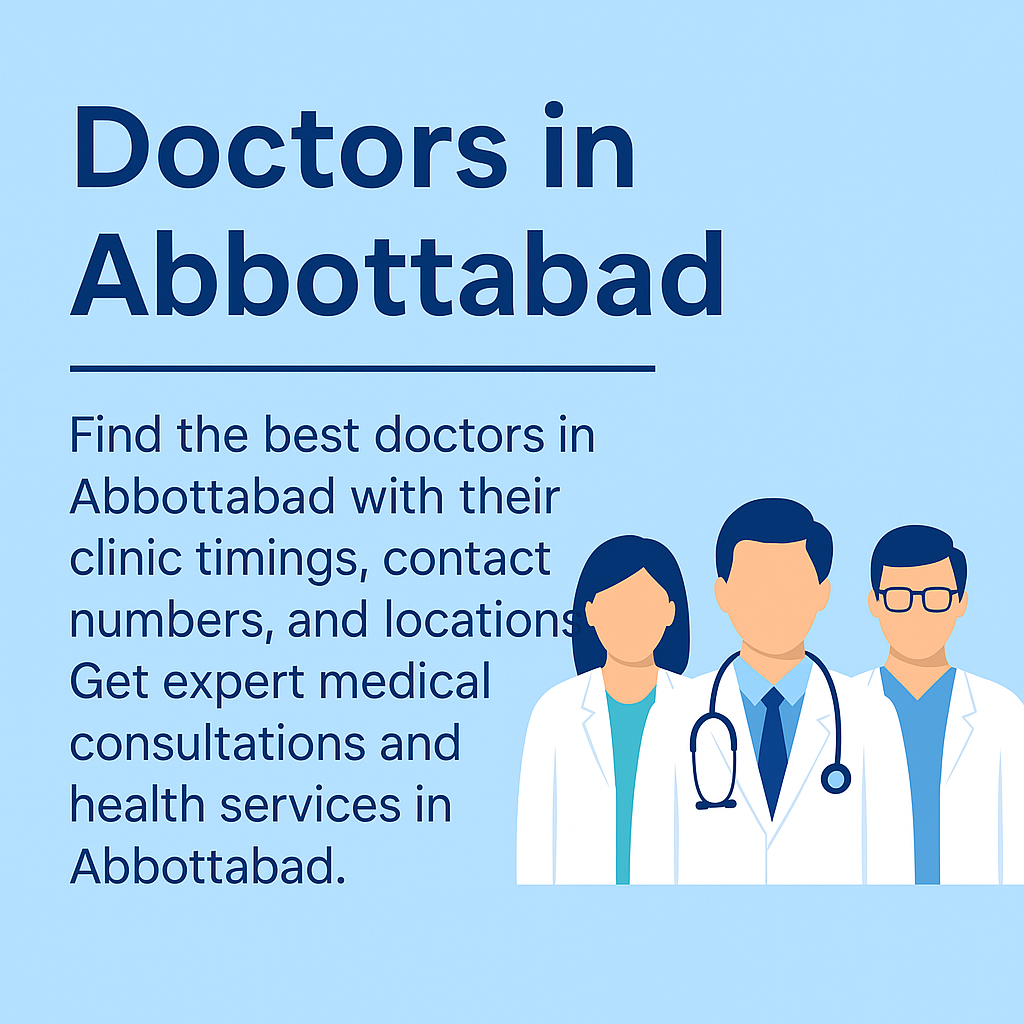Doctors in Abbottabad – 2025: A Complete Guide to Healthcare Services. Abbottabad, a city located in the Hazara region of Khyber Pakhtunkhwa, is known not only for its picturesque views and pleasant weather but also for its growing healthcare system. As the city’s population increases, so does the need for specialized medical care. In this article, we will delve into the details of healthcare facilities and doctors in Abbottabad, discussing their specialties, challenges, and their role in the well-being of the local community. With a combination of government-run hospitals, private healthcare providers, and specialized medical professionals, Abbottabad is a hub of healthcare services that cater to both the urban and rural population. This guide will provide insights into various types of doctors practicing in the region, their qualifications, healthcare options, and how the future of healthcare in Abbottabad is shaping up.
1. History and Evolution of Healthcare in Abbottabad
Abbottabad’s healthcare system has evolved over the years, influenced by both government initiatives and private sector growth. From humble beginnings, the city now boasts several state-of-the-art medical facilities, yet it still faces numerous challenges related to access and affordability.
Early Healthcare Developments: In the early 20th century, healthcare in Abbottabad was rudimentary, with few medical practitioners serving a limited population. Early healthcare services were mostly provided by local doctors or through small dispensaries.
Growth and Expansion: Over the decades, government investment in healthcare infrastructure has led to the establishment of larger hospitals and specialized clinics. With the increasing population and urbanization, Abbottabad’s healthcare sector has become more sophisticated, with an influx of trained professionals offering advanced medical treatments.
Role of Private Sector: The private healthcare sector in Abbottabad has flourished in recent years. High-end private hospitals and clinics provide specialized services, often catering to the affluent segments of society. These private institutions complement public healthcare services, filling the gap in specialized care and offering faster access to medical attention.
2. Types of Doctors Practicing in Abbottabad / Doctors in Abbottabad – 2025
Abbottabad is home to a diverse group of medical professionals who provide care across various specialties. Whether you are seeking general healthcare or specialized treatment, there are many doctors to choose from. Here are the most common types of doctors you will find in Abbottabad:
General Practitioners (GPs)
General practitioners, also known as family doctors, are usually the first point of contact for patients seeking medical advice. They diagnose and treat a wide range of health conditions and provide preventive care.
Common Services: Routine checkups, vaccinations, management of chronic conditions (like diabetes and hypertension), and minor illnesses.
Role in the Community: GPs play an essential role in managing public health by offering early diagnosis and treatment. They are often involved in health education and preventive healthcare.
Specialists / Doctors in Abbottabad – 2025
Abbottabad has a range of specialist doctors who focus on specific areas of medicine. These include:
-Cardiologists: Experts in diagnosing and treating heart conditions such as coronary artery disease, heart attacks, and arrhythmias.
– Orthopedists: Doctors specializing in musculoskeletal issues, including fractures, joint problems, and surgeries like joint replacements.
– Neurologists: These doctors treat disorders of the brain and nervous system, including conditions like epilepsy, migraines, and Parkinson’s disease.
– Dermatologists: Specializing in skin, hair, and nail health, dermatologists treat conditions like acne, eczema, and skin cancer.
– Pediatricians: Pediatricians are experts in child healthcare, providing services ranging from vaccinations to treating childhood diseases.
– Psychiatrists: Mental health professionals who diagnose and treat mental disorders such as depression, anxiety, and schizophrenia.
Surgeons
Surgeons in Abbottabad are highly trained medical professionals who perform surgical operations. They specialize in a variety of areas, including general surgery, orthopedic surgery, and neurosurgery.
Types of Surgery: From routine procedures like appendectomies to complex surgeries such as spinal surgeries, Abbottabad’s surgeons are skilled in a wide range of operations.
Key Facilities: Many surgeries are conducted in private hospitals, which are equipped with advanced operating theaters and recovery units.
Dentists
Dentists in Abbottabad are trained professionals who specialize in oral health, including the prevention, diagnosis, and treatment of dental and gum conditions.
Services Provided: Teeth cleanings, root canals, extractions, orthodontic treatments, and cosmetic dentistry (e.g., teeth whitening, veneers).
Other Specialized Doctors
– Gynecologists & Obstetricians: Women’s health specialists focusing on pregnancy, childbirth, and reproductive health.
– Urologists: These doctors treat urinary tract and male reproductive health issues.
– Ophthalmologists: Specialists in eye care and surgeries related to vision problems, including cataract surgeries and retinal treatments.
3. Government Healthcare Facilities in Abbottabad
Government-run hospitals in Abbottabad play a crucial role in providing healthcare services to a large portion of the population. These facilities are often more affordable than private ones and are accessible to people from all walks of life.
District Headquarter Hospital Abbottabad (DHQ): The District Headquarter Hospital is the largest government hospital in Abbottabad. It serves as the main healthcare provider for a large population, offering both general healthcare services and specialized treatments. The hospital is equipped with a range of medical facilities, including:
– Emergency Services: 24/7 emergency services for accident victims, heart attacks, and other critical conditions.
– Specialized Departments: Departments for cardiology, neurology, orthopedics, and more.
– Outpatient and Inpatient Services: Both outpatient consultations and inpatient admissions are available.
Basic Health Units (BHUs) and Rural Health Centers (RHCs): Abbottabad’s rural areas are served by Basic Health Units (BHUs) and Rural Health Centers (RHCs), which provide primary healthcare services. These smaller healthcare facilities offer basic diagnostic services, vaccinations, maternal care, and treatment for common illnesses.
Healthcare Challenges in the Public Sector:
– Understaffing: Public hospitals often face issues related to understaffing, with a limited number of specialized doctors available in rural areas.
– Overcrowding: Government healthcare facilities frequently experience overcrowding due to a high volume of patients seeking affordable healthcare.

